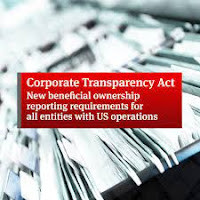On August 7, 2023 we posted New Beneficial Ownership Information Requirement for Most Businesses Beginning January 1, 2024, where we discussed that neginning on January 1, 2024, many corporations, limited liability companies, and other entities created or registered to do business in the United States must report information about their beneficial owners, the persons who ultimately own or control the company, to the U.S. Department of the Treasury’s Financial Crimes Enforcement Network (FinCEN).
Now according to Law360, the U.S. Treasury Department's financial crimes unit will start applying new reporting requirements for small businesses in about five months.
But Many Of The Roughly 32 Million Companies Affected By The Disclosure Rules May Not Yet Be Aware Of Them.
Final regulations from the Financial Crimes Enforcement Network aim to expose anonymous shell companies by requiring reports of beneficial ownership information from small businesses, many of which may not work with attorneys or accountants who keep them informed about compliance obligations, according to specialists. Resource constraints may also hamper FinCEN's public outreach regarding the rules, which were finalized in September and will go into effect on Jan. 1, 2024.
Small businesses would likely be concerned about how to interpret terms such as "beneficial owner," according to Niles Elber, a member at Caplin & Drysdale. But most of them probably don't even know about FinCEN's reporting rules, he said.
"They're trying to get the word out and provide some guidance," Elber said, noting for example the FAQ posting in March. "But who in God's green earth is going to the FinCEN website?"
According to the final regulations, a beneficial owner is defined as any individual who meets at least one of two criteria: exercising "substantial control" over the reporting company, or owning or controlling at least 25% of the ownership interest of the company.
The rules exempt so-called large operating companies, which are defined as having more than 20 full-time employees in the U.S. and more than $5 million in gross receipts or sales on their federal tax returns. Businesses in heavily regulated industries, banking and securities, for example, are also exempt under the CTA.
Approximately 32.6 Million Companies Will Be Subject To
The Reporting Requirements In The First Year They're
In Effect And Approximately 5 Million New Companies
Will Fall Under The Rules Each Subsequent Year,
According To Estimates From FinCEN.
Candice Basso, a spokesperson for FinCEN, told Law360 that the Treasury unit has "conducted extensive outreach" to various stakeholders, including the small business community, to inform them about their reporting obligations and to better understand their questions and concerns. FinCEN is also working on an upcoming small entity compliance guide that will contain checklists to help reporting entities collect and report information on beneficial ownership, as well as a webinar that will describe the reporting process, she said.
Meanwhile, FinCEN's limited resources have raised questions about how selective the unit will be when enforcing penalties for noncompliance with the beneficial ownership rules.
FinCEN's potential limitations with informing small businesses about the beneficial ownership rules could leave certain education efforts to banks, but any outreach from financial institutions may depend on their own compliance obligations under the CTA.
Banks are currently subject to a customer due diligence, or CDD, rule that requires financial institutions to identify and verify the beneficial owners of companies that open accounts. The CTA requires FinCEN to revise portions of the CDD rule to bring it into conformity with the new legislation and the Anti-Money Laundering Act as a whole.
"I suspect that what's going to happen is banking is going to be the deputies that are going to have to break this news to most people," he said.
In the meantime, it's unclear what banks may do when they compare information that they collect under the CDD rule against information that their customers submit to the database or if banks try to make the comparison at all.
FinCEN proposed rules in December that spell out when governments and banks may be granted access to the beneficial ownership information submitted by small businesses. According to the regulations, banks can use the database only to facilitate CDD compliance.
Despite the challenges that FinCEN may face in educating millions of small companies about the rules, specialists say the CTA is designed to affect a broad range of businesses so it's more difficult for shell companies to evade detection.
This objective means that FinCEN should be "writing the rule broadly to include in their reporting as many corporate entities as possible while narrowly limiting the exemptions to the smallest possible set permitted by the law," according to the letter.
Quick added, "If you try to narrow it down too much, the people you're dealing with are very sophisticated and are going to find a way to get around it."
Have A Beneficial Ownership QuestionProblem?
www.TaxAid.com or www.OVDPLaw.com
or Toll Free at 888 8TAXAID (888-882-9243)
Read more at: Tax Times blog






